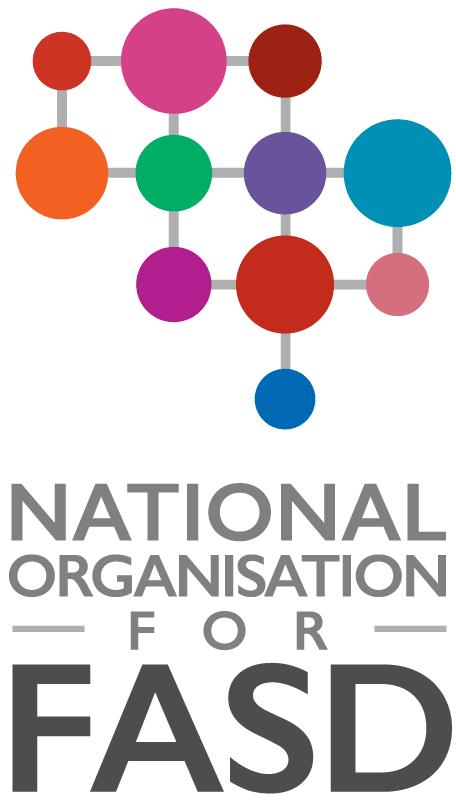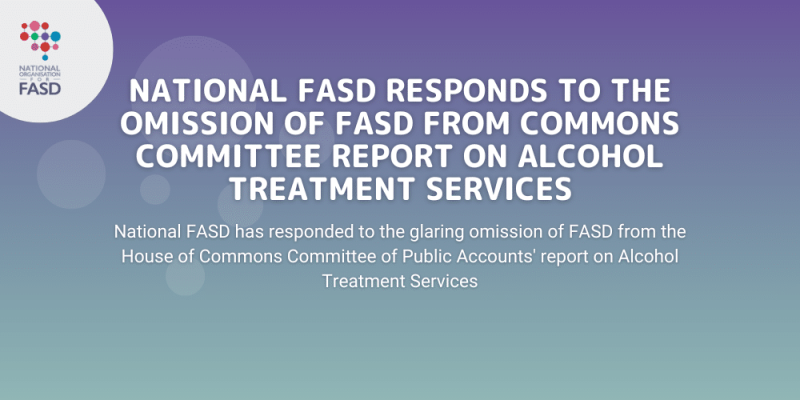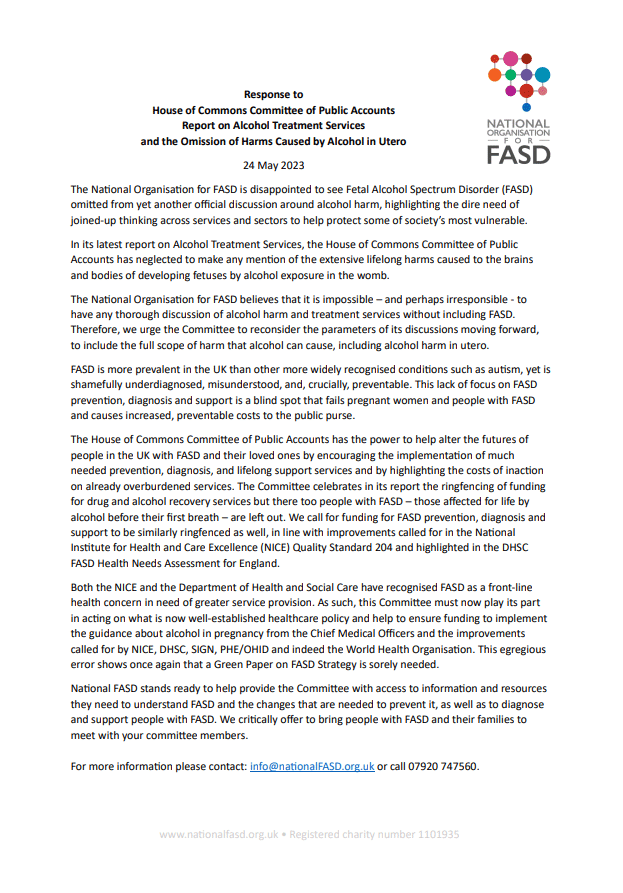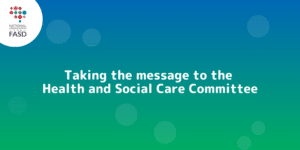Yesterday, the House of Commons Committee of Public Accounts published its report on Alcohol Treatment Services.
Nowhere in the near 30-page report is FASD or harms caused by alcohol exposure in utero mentioned. This is in spite of the Committee receiving written evidence regarding the need for specialist treatment services for specialist support for women in pregnancy from local alcohol and substance misuse providers and other mentions of FASD prior to the report’s publication.
National FASD has therefore released an official statement calling on the Committee to urgently reconsider the scope of its considerations around the harms caused by alcohol to include the much-needed prevention of FASD, as well as the diagnosis and lifelong support of people with FASD.
Just as funds have been ringfenced for alcohol treatment services, we call for ringfencing funds for FASD prevention, diagnosis and support. With expected governmental income from alcohol duties estimated to be more than £13billion in 2023-24 (according to the Office for Budget Responsibility), it seems only right and fair.
You can download our full statement below.
National FASD's official statement
The National Organisation for FASD is disappointed to see Fetal Alcohol Spectrum Disorder (FASD)
omitted from yet another official discussion around alcohol harm, highlighting the dire need of
joined-up thinking across services and sectors to help protect some of society’s most vulnerable.
In its latest report on Alcohol Treatment Services, the House of Commons Committee of Public
Accounts has neglected to make any mention of the extensive lifelong harms caused to the brains
and bodies of developing fetuses by alcohol exposure in the womb.
The National Organisation for FASD believes that it is impossible – and perhaps irresponsible – to
have any thorough discussion of alcohol harm and treatment services without including FASD.
Therefore, we urge the Committee to reconsider the parameters of its discussions moving forward,
to include the full scope of harm that alcohol can cause, including alcohol harm in utero.
FASD is more prevalent in the UK than other more widely recognised conditions such as autism, yet is
shamefully underdiagnosed, misunderstood, and, crucially, preventable. This lack of focus on FASD
prevention, diagnosis and support is a blind spot that fails pregnant women and people with FASD
and causes increased, preventable costs to the public purse.
The House of Commons Committee of Public Accounts has the power to help alter the futures of
people in the UK with FASD and their loved ones by encouraging the implementation of much
needed prevention, diagnosis, and lifelong support services and by highlighting the costs of inaction
on already overburdened services. The Committee celebrates in its report the ringfencing of funding
for drug and alcohol recovery services but there too people with FASD – those affected for life by
alcohol before their first breath – are left out. We call for funding for FASD prevention, diagnosis and
support to be similarly ringfenced as well, in line with improvements called for in the National
Institute for Health and Care Excellence (NICE) Quality Standard 204 and highlighted in the DHSC
FASD Health Needs Assessment for England.
Both the NICE and the Department of Health and Social Care have recognised FASD as a front-line
health concern in need of greater service provision. As such, this Committee must now play its part
in acting on what is now well-established healthcare policy and help to ensure funding to implement
the guidance about alcohol in pregnancy from the Chief Medical Officers and the improvements
called for by NICE, DHSC, SIGN, PHE/OHID and indeed the World Health Organisation. This egregious
error shows once again that a Green Paper on FASD Strategy is sorely needed.
National FASD stands ready to help provide the Committee with access to information and resources
they need to understand FASD and the changes that are needed to prevent it, as well as to diagnose
and support people with FASD. We critically offer to bring people with FASD and their families to
meet with your committee members.
For more information please contact: info@nationalFASD.org.uk or call 07920 747560
For more information about alcohol harm in pregnancy ...
If you’d like to learn more about the harms caused by alcohol exposure in the womb, make sure to register for our next FASD Book Club session with Prof Moira Plant on ‘Alcohol-Related Harm and Pregnancy: Public Policy, Attitudes and Recognition’.
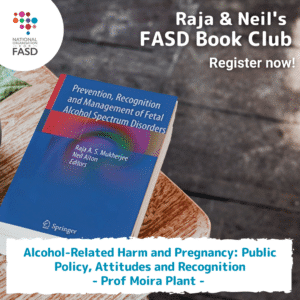
Moira Plant is Emeritus Professor of Alcohol Studies at the University of West of England in Bristol, UK and Adjunct Professor at Curtin University Perth Australia.
Moira is the UK lead on the Gender Alcohol and Culture: An International Project (GENACIS) which includes over 40 countries worldwide. She has acted as a consultant to WHO, the UK and other governments, the Centre for Addiction Research & Education Scotland (CARES) and is a UK consultant to the US Collaborative Initiative on Fetal Alcohol Spectrum Disorders (CIFASD). Moira is a psychotherapist and trains and supervises counsellors.
Her session will be from 12.30pm to 13:00pm on the 30th May. Register free now using the button below!
